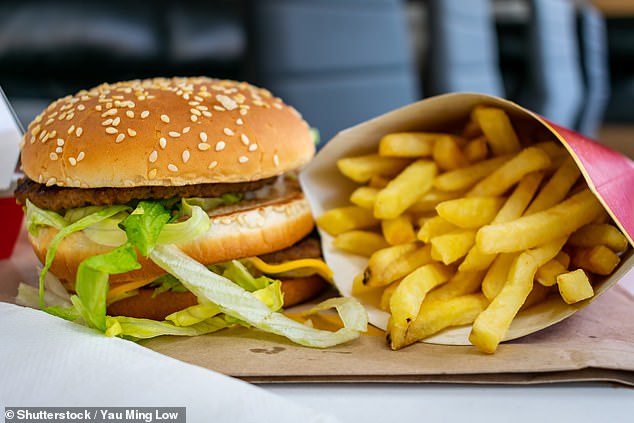By EMILY STEARN, SENIOR HEALTH REPORTER
Published: | Updated:
Consuming a diet low in ultra-processed foods could help supercharge weight loss, promising research suggested today.
Additive-laden foods such as crisps and sweets have been vilified for decades over their supposed risks, with dozens of studies linking them to type 2 diabetes, heart disease and cancer.
Experts have even called for UPFs—typically anything edible that has more artificial ingredients than natural ones—to be slashed from diets.
Now, British scientists who tracked dozens of adults have discovered those who ate a diet rich in minimally processed foods and avoided UPFs, lost twice as much weight as those who often consumed UPFs.
Sticking to meals cooked from scratch could also help curb food cravings, they also found.
However, diets high in UPFs had little impact on blood pressure, heart rate, liver function and cholesterol.
Researchers today argued their findings echoed calls to limit certain types of UPFs but cautioned it also showed that not all UPFs are ‘inherently unhealthy’.
Dr Samuel Dicken, an expert in behavioural science and health at University College London and study co-author, said: ‘We saw significantly greater weight loss on the minimally processed food diet.

‘Previous research has linked ultra-processed foods with poor health outcomes.
‘But not all ultra-processed foods are inherently unhealthy based on their nutritional profile.’
In the study, the researchers tracked 50 people who were already consuming diets packed with UPFs and split them into two groups.
Half were given an eight-week diet plan comprising minimally processed foods, such as overnight oats and spaghetti bolognese, while the other half were given foods like breakfast oat bars or lasagne ready meals.
After completing one diet, the groups then switched.
Researchers matched the two diets nutritionally on levels of fat, saturated fat, protein, carbohydrates, salt and fibre using the Eatwell Guide, which outlines recommendations on how to eat a healthy, balanced diet.
They found those on the minimally processed diet lost more weight (2.06 per cent) compared to the UPF diet (1.05 per cent loss).
The UPF diet also did not result in significant fat loss, the researchers said.
Dr Dicken added: ‘Though a 2 per cent reduction may not seem very big, that is only over eight weeks and without people trying to actively reduce their intake.
‘If we scaled these results up over the course of a year, we’d expect to see a 13 per cent weight reduction in men and a 9 per cent reduction in women on the minimally processed diet, but only a 4 per cent weight reduction in men and 5 per cent in women after the ultra-processed diet.
‘Over time this would start to become a big difference.’
Those on the trial were also asked to complete questionnaires on food cravings before and after starting the diets.
Those eating minimally processed foods had less cravings and were able to resist them better, the study suggests.
However, researchers also measured others markers like blood pressure, heart rate, liver function, glucose levels and cholesterol and found no significant negative impacts of the UPF diet.
The Eatwell Guide recommends the average woman should consume around 2,000 calories a day, while an average man should consume 2,500.
Both diet groups had a calorie deficit, meaning people were eating fewer calories than what they were burning, which helps with weight loss.
However, the deficit was higher from minimally processed foods at around 230 calories a day, compared with 120 calories per day from UPFs.
Professor Rachel Batterham, senior author of the study from the UCL centre for obesity research, said: ‘Despite being widely promoted, less than 1 per cent of the UK population follows all of the recommendations in the Eatwell Guide, and most people stick to fewer than half.
‘The best advice to people would be to stick as closely to nutritional guidelines as they can by moderating overall energy intake, limiting intake of salt, sugar and saturated fat, and prioritising high-fibre foods such as fruits, vegetables, pulses and nuts.
Tracy Parker, nutrition lead at the British Heart Foundation, also said: ‘The way this study was designed means it is more reflective of real-world conditions than previous research on UPFs.
‘The small size of the study is a limitation, and the fact that most participants were women limits how much we can generalise the findings to the general population.
‘We also can’t be certain how closely the diets were followed, as participants self-reported what they ate during the study.
‘Larger, longer-term studies will be needed to see if the greater weight loss on the minimally processed diets seen here translates into bigger improvements in risk factors, including blood pressure and cholesterol and blood sugar levels, and a reduced risk of developing heart and circulatory diseases.
‘Completely cutting UPFs out of our diets isn’t realistic for most of us.
But including more minimally processed foods—like fresh or home cooked meals—alongside a balanced diet could offer added benefits too.’








